人教八下 Unit 2 I'll help to clean up the city parks.单元综合复习课件
文档属性
| 名称 | 人教八下 Unit 2 I'll help to clean up the city parks.单元综合复习课件 |  | |
| 格式 | pptx | ||
| 文件大小 | 39.9MB | ||
| 资源类型 | 试卷 | ||
| 版本资源 | 人教新目标(Go for it)版 | ||
| 科目 | 英语 | ||
| 更新时间 | 2024-03-13 21:46:07 | ||
图片预览



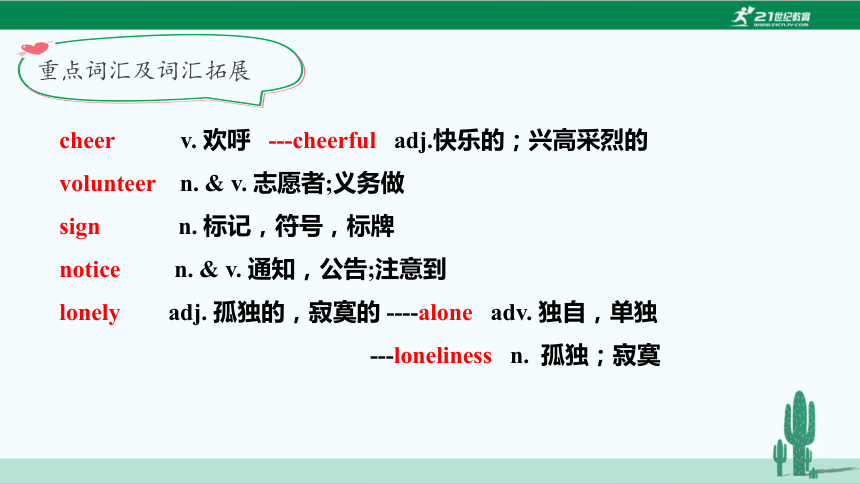
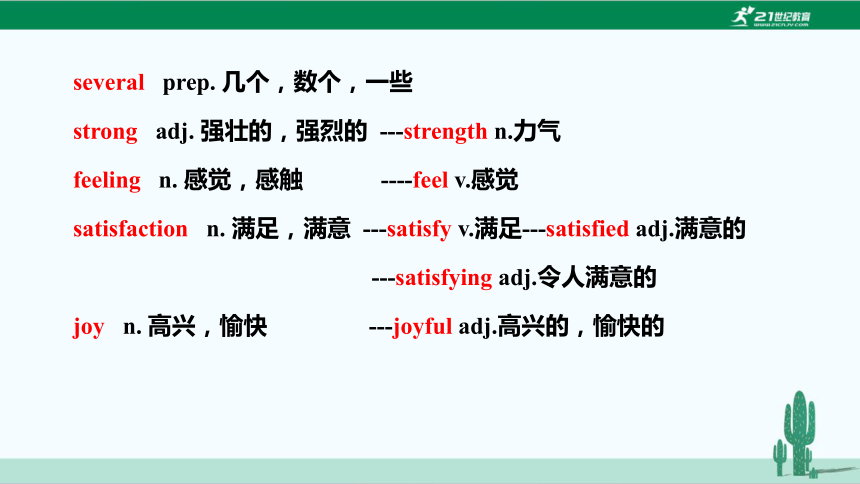
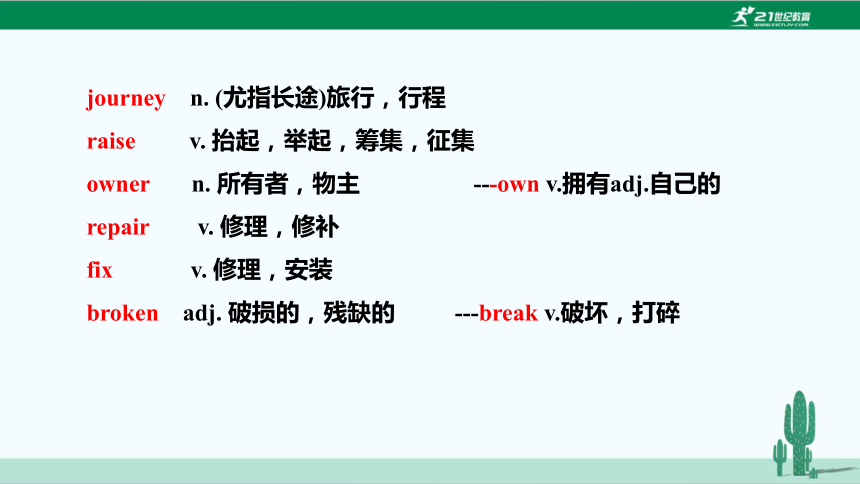
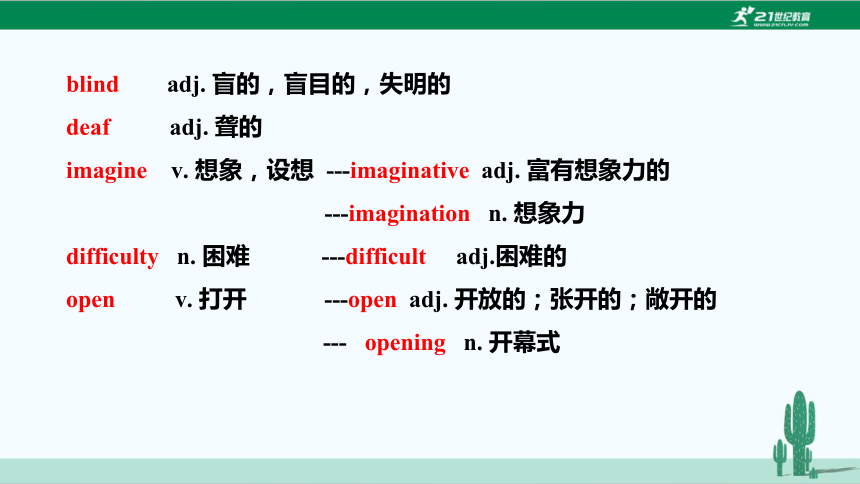
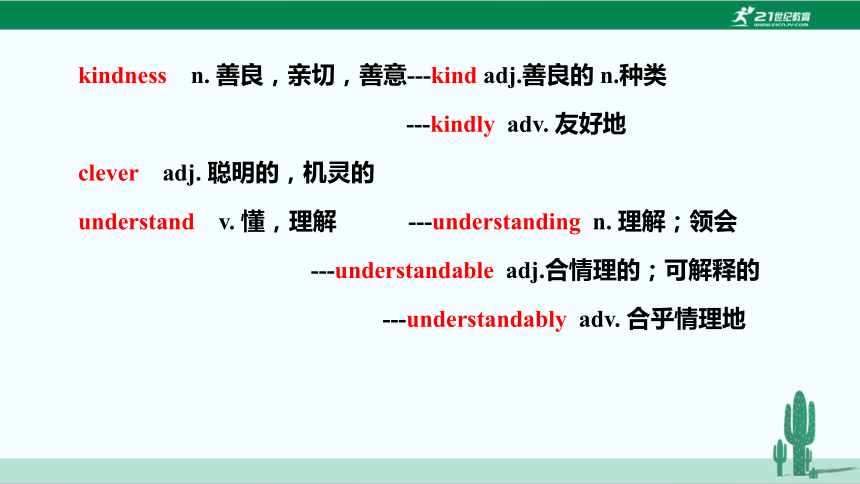
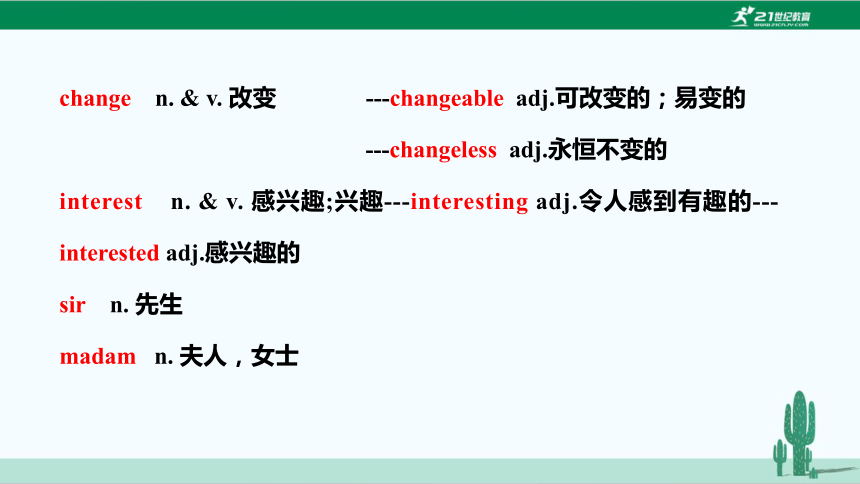
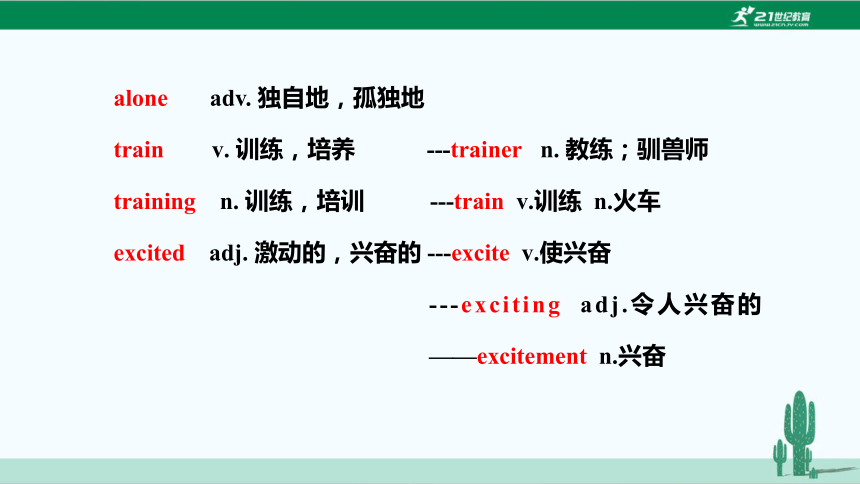
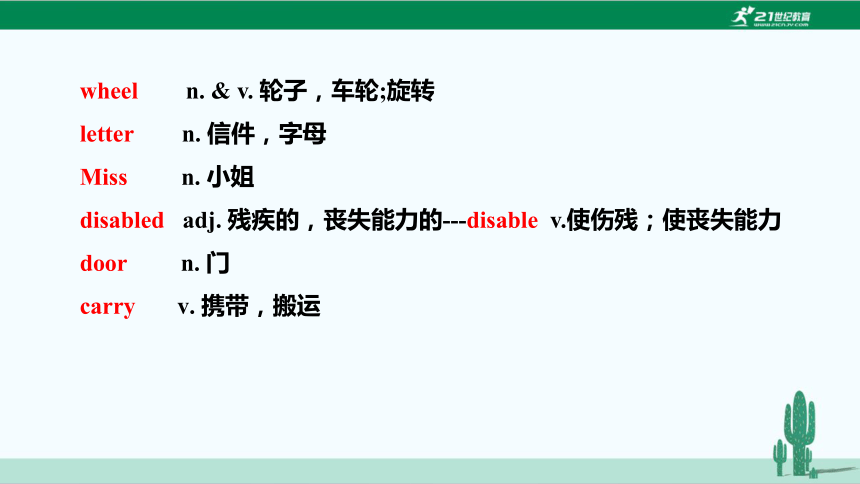
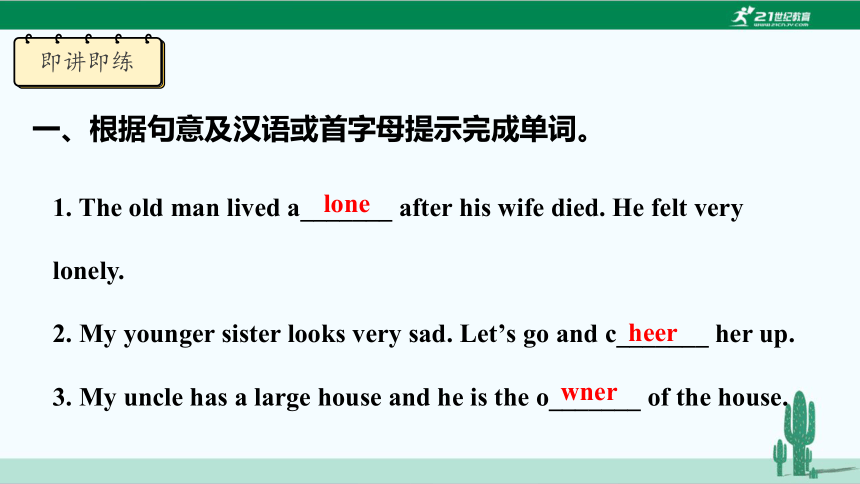
文档简介
(共93张PPT)
Unit 2 单元综合复习
人教版八年级下册
Content
词汇、短语回顾
01
重点句子回顾
02
重点词句精讲
03
语法知识精讲
04
单元话题写作
05
能力提升训练
06
目录
词汇、短语回顾
cheer v. 欢呼 ---cheerful adj.快乐的;兴高采烈的
volunteer n. & v. 志愿者;义务做
sign n. 标记,符号,标牌
notice n. & v. 通知,公告;注意到
lonely adj. 孤独的,寂寞的 ----alone adv. 独自,单独
---loneliness n. 孤独;寂寞
重点词汇及词汇拓展
several prep. 几个,数个,一些
strong adj. 强壮的,强烈的 ---strength n.力气
feeling n. 感觉,感触 ----feel v.感觉
satisfaction n. 满足,满意 ---satisfy v.满足---satisfied adj.满意的
---satisfying adj.令人满意的
joy n. 高兴,愉快 ---joyful adj.高兴的,愉快的
journey n. (尤指长途)旅行,行程
raise v. 抬起,举起,筹集,征集
owner n. 所有者,物主 ---own v.拥有adj.自己的
repair v. 修理,修补
fix v. 修理,安装
broken adj. 破损的,残缺的 ---break v.破坏,打碎
blind adj. 盲的,盲目的,失明的
deaf adj. 聋的
imagine v. 想象,设想 ---imaginative adj. 富有想象力的 ---imagination n. 想象力
difficulty n. 困难 ---difficult adj.困难的
open v. 打开 ---open adj. 开放的;张开的;敞开的
--- opening n. 开幕式
kindness n. 善良,亲切,善意---kind adj.善良的 n.种类
---kindly adv. 友好地
clever adj. 聪明的,机灵的
understand v. 懂,理解 ---understanding n. 理解;领会
---understandable adj.合情理的;可解释的
---understandably adv. 合乎情理地
change n. & v. 改变 ---changeable adj.可改变的;易变的 ---changeless adj.永恒不变的
interest n. & v. 感兴趣;兴趣---interesting adj.令人感到有趣的---interested adj.感兴趣的
sir n. 先生
madam n. 夫人,女士
alone adv. 独自地,孤独地
train v. 训练,培养 ---trainer n. 教练;驯兽师
training n. 训练,培训 ---train v.训练 n.火车
excited adj. 激动的,兴奋的 ---excite v.使兴奋 ---exciting adj.令人兴奋的 ——excitement n.兴奋
wheel n. & v. 轮子,车轮;旋转
letter n. 信件,字母
Miss n. 小姐
disabled adj. 残疾的,丧失能力的---disable v.使伤残;使丧失能力
door n. 门
carry v. 携带,搬运
一、根据句意及汉语或首字母提示完成单词。
即讲即练
1. The old man lived a_______ after his wife died. He felt very lonely.
2. My younger sister looks very sad. Let’s go and c_______ her up.
3. My uncle has a large house and he is the o_______ of the house.
lone
heer
wner
4. They held a concert to r_______ money for Project Hope.
5. She wants to he a __________(志愿者).
6. There are __________(几个) girls in the room. They are talking about the vacation plans.
7. They have a strong feeling of _____________(满足).
— You can ask Tony for help.
volunteer
several
satisfaction
aise
8. — My alarm clock doesn’t work. Who can help me r_______ it
9. Please o_______ the window and let the fresh air in.
10. I can’t ______(想象) what the future life is like.
epair
pen
imagine
clean up 打扫(清除)干净
cheer up 变得更高兴,振奋起来
give out 分发,散发
come up with 想出,提出
put off 推迟
hand out 分发
重点短语
care for 照顾,非常喜欢
try out 参加…选拔,试用
fix up 修理,修补
give away 赠送,捐赠
take after (外貌或行为)像
call up 打电话给…某人,征召
used to 曾经…,过去…
set up 建立,设立
make a difference 影响,有作用
help out (帮助……)分担工作;解决难题
at the age of ... 在……岁时
go on a different journey 进行一次不同的旅行
by oneself 独自;单独
volunteer to do sth. 自愿做某事
make a difference (to) (对……)影响;有作用
be similar to 与……相像的、类似的
at once 立刻;马上
be strong in 强项是……
do the volunteer job 做志愿工作
at the same time 同时
即讲即练
1. 你可以帮助打扫城市公园。
You ____________ ______ ______ clean up the city parks.
2. 我希望你的梦想能够实现。
I hope your dream can _____ _____.
3. 谢谢你帮我做家务。
______ ______ ______ _________ me with housework.
一、根据汉语提示完成句子。
can/could help to
Thank you for helping
come true
4. Lily说她有能力自己完成这项工作。
Lily said that she ______ _____ _____ finish the work by herself.
5. 我的观点和你的相似。
My opinions are __________ ______ yours.
6. 那位教授对我的生活产生了影响。
The professor ______ ______ ____________ to my life.
make a difference
was able to
similar to
7. 我们得尽力使他振作起来。
We should try to ______ ______ ______.
8. 你认为他会把钱花光吗?
Do you think that he will _____ _____ _____ all the money
cheer him up
run out of
重点句子回顾
1. The boy could give out food at the food bank. 这个男孩可以在食品救济站分发食物。
2. Clean-Up Day is only two weeks from now. 清洁日离现在仅仅两周的时间。
3. He volunteers at an animal hospital every Saturday morning. 每周六上午,他都在一家动物医院当志愿者。
4. Last year, she decided to try out for a volunteer after-school reading program. 去年,她决定去参加一个课外阅读项目的志愿者的选拔。
5.You can see in their eyes that they're going on a different journey with each new book. 从他们的眼睛里你可以看到他们正在进行每本不同的新书之旅。
6. I want to put off my plan to work in an animal hospital until next summer. 我想把我在动物医院工作的计划推迟到明年夏天。
7. Most people today are only worried about getting good jobs to make lots of money. 现在的大部分人只是为找一份能挣许多钱的好工作而着急。
8. You helped to make it possible for me to have Luck. 在你的帮助下,我才有可能拥有“幸运儿”。
重点词句精讲
1.could用法
could为情态动词,后接动词原形,语气较can更弱。
用于提出建议或请求
You could help to clean up the city parks.你可以帮助打扫城市公园。
表示请求或要求
Could I have a drink of water,please 我可以喝点水吗
表示能力(can的过去式)
By the time she was cight,she could read Greek.她八岁时就会读希腊文了。
表示可能性
It could be weeks before we get a reply.我们可能要等好几个星期才能得到回复。
2.clean up打扫(或清除)干净
clean up是“动词+副词”结构的短语,在此类结构的短语中,其后如果接代词作宾语,代词要放在动词和副词中间。
★We spent all day clean up our classroom.我们一整天都在打扫教室。
★You room is dirty.You should clean it up.你的房间脏了,你应该把它打扫干净。
【拓展】elean-up n.打扫,清洁
★millions of dollars in clean-up costs数百万美元的清洁费用
3.cheer up (使)高兴起来,(使)振作起来
cheer up是“动词+副词”结构的短语,其后接代词作宾语时,代词要放在动词和副词中间。
★Cheer them up使他们振作起来
★Cheer up!The worst is over!振作起来!最坏的情况已经过去了。
4.give out
(=hand out)分发,散发
★The teacher gives out books to students.老师把书发给学生。
发出(光、热等)
★The lamp gives out a white light.台灯发出白色的光。
耗尽;用光
★Our supplies are giving out.我们的补给快要用完了。
【拓展】give相关的其他短语
give up放充 give away捐赠 give back归还,还给
give off发出;放出 give in屈服,让步
5.come up with(=think up)想出;提出(主意、计划、回答等)
★He came up with a better idea finally.最后他提出了一个更好的主意。
【拓展】come有关的短语
come on加油;快点儿 come down下来
come over过来;顺便拜访 come out出来;开花;(书)出版
come in进来 come from来自
come true实现
6.put off推迟
★Please don't put off doing your homework请不要拖着不做作业。
【拓展】put有关的短语
put out熄灭 put on穿上;上演
put away收起来;放好 put …into投入(时间、心思等)
put up张贴;搭建;举起 put down放下
put back放回原处;把(钟)拨慢
7.notice
v. 注意到:意识到
★The notice on the wall said No smoking.墙上的通告写着“禁止吸烟”。
n.通知;通告
★I'll put up a notice about the meeting.我会贴一张会议通告的。
n.注意
★I didn't pay much notice to her suggestions.我没太在意她的建议。
【用法】
notice sb.do/doing sth.注意到某人做了/正在做某事
★I noticed him doing homework.我注意到他正在写作业。
notice +that从句注意到……
★She noticed that her mother got angry.她注意到她的妈妈生气了。
8.call up打电话给……;征召
★We could each call up 10 students and ask them to come.我们可以每个人给10个学生打电话,并让他们过来。
★l was called up three months after the war broke out.战争爆发三个月后我应征入伍。
9.used to过去……;曾经……
used to指已经不存在的动作或状态,其后接动词原形,并且不与表示过去的时间状语连用。其否定形式为didn'tuse to或used not to。
★She used to be a singer.她过去是一名歌手。
10.lonely
adj. 孤独的,寂寞的(指心灵上的孤独,具有伤感色彩。)
★The old felt very lonely without his children.没有孩子们(陪伴)老人感到很孤独。
adj. (用在名词前做定语)偏僻的;人迹罕至的
★There lived an old hunter in a lonely village.偏僻的村庄里住着一位年迈的猎人。
11.care for照顾;非常喜欢
care for相当于look after/take care of
★He thanked the nurses who had cared for him.他对照顾他的护士表示了谢意。
★I don't care for his parents.我不大喜欢他的父母。
【拓展】care有关的短语
care about关心;在意 take care当心;小心 take care of照顾
12.by oneself独自;单独;独立地
by oneself =alone=on one's own
★All students must finish their homework by themselves.所有学生必须独立地完成作业。
★I walked for a while by myself in the park.我在公园里独自走了一会儿
13.try out参加……选拔(常与for连用);试用
★In high school,I tried out for all the females leads.上中学时,凡是选女主角我都要去试试。
★I'm trying out a new computer.我在试用一台新电脑。
14. go on a+ n.进行……;举行……
go on a trip去旅行 go on a vacation去度假
go on a picnie去野餐 go on a ride去兜风
e true实现;成为现实(主语常为梦想、愿望或目标等)
★My dream will come true one day!我的梦想终有实现的一天!
★His dream of becoming a teacher came frue.他当教师的梦想实现了。
16.at the same time同时
★Perhaps you can do both at the same time.或许你可以同时做两件事。
【拓展】time相关的短语
all the time一直 all times有时
time and time again一再 on time按时
in time及时 from time to time不时
17.homeless adj.无家可归的
homeless由“home(n.家)+-less(形容词后缀)”构成
the homeless表示“无家可归的人”。
★Thousands of people have been made homeless.成千上万的人被逼无家可归。
【拓展】-less表示“没有,无”,常加在名词后构成形容词。
如:careless粗心的 helpless无助的 colorless无色的,苍白的
18.put up张贴
★He put up a poster on the wall.他在墙上张贴了一张海报。
【拓展】put up其他的含义
(1)建造,搭建
★They're putting up several new office blocks in the centre of town.他们正在城中心建造几幢新办公楼。
(2)提出(建议等)
★Linda put up a new solution in the meeting.会上,琳达提出了一个新的解决方案。
(3)举起
★I put up my hand and asked to leave the rvom.我举手要求离开房间。
19.take after (外貌或行为)像
take after=be similar to,表示与家中的长辈(因血缘关系)相像,尤指与父母像,不能用于进行时。其中,after是介词,其后接名词或代词。
★I take after my mother's family.我像母亲家族的人。
20.fix up修理;安装;安排(会议、活动等)
★My radio doesn't work.Could you fix it up for me 我的收音机坏了,你能帮我修理一下吗
★We have fixed up the trip to Shanghai.我们已经安排好了去上海的旅行。
21.give away 赠送,捐赠;颁发;泄露(秘密)
★We're giving away a free diary with tomorrow's newspaper明天的报纸我们将附赠一本日记本。
★Give your ald clothes away to a thrift shop.把你的旧衣服送给慈善商店吧。
★He gave away as little information as possible.他尽可能不透露信息。
22.be similar to .…与……相像、类似
★My clothes are similar to yours.我的衣服和你的相似。
【拓展】besimilar in sth.在某方面相似
★ We have similar tastes in music.我们对音乐的品味相近。
23.give sth. to sb.=give sb. sth.把某物给某人;给某人某物
★Please give the book to me.=Please give me the book.请把书递给我。
24.set up建起;设立
其后常接表示组织、机构、团体等意义的名词,如school, hospital, government, company等。
★Do you plan to set up your own company 你计划创办自己的公司吗
25.disabled adj.有残疾的;丧失能力的
the disabled残疾人(指一类人,表示复数意义)
★It's necessary to help the disabled.帮助残疾人很有必要。
★The theatre has good access for the disabled.剧院为残疾人准备了很方便的通道。
【拓展】able adj.有能力的
disable v.使失去能力;使残疾
disabled adj.有残疾的;丧失能力的
26.make a difference (to sb./sth.) (对某人某事)有影响、有作用
【反义短语】make no difference没影响;没作用
★It could make the difference between missing your train and getting to work on time.误了火车还是准时上班,这可能是关键所在。
★Whatever she did,it made no difference.不管她做了什么都没有关系的。
★It makes no difference to me.这对我没什么影响。
27.imagine v. 想象;设想
imagine (sb.) doing sth.想象(某人)做某事
★He couldn't imagine living in a place without water他无法想象在一个没有水的地方生活。
②imagine+n./pron.想象……
★Can you imagine life without electricity 你能想象没有电的生活吗
③imagine+that从句想象……
★She had imagined that the doctor would be male.她原本以为会是个男医生。
【拓展】imagination n.想象力;想象
28.difficulty n.困难
have diffieulty (in)doing sth.做某事有困难
have difficulties with sth.在某方面有困难
★They had great difficulty(in)finding a replacement.他们找个代替的人很困难。
★She soon got into dificulties with debt.她很快就因债务陷入了困境。
★He found it difficult to get a job.他发现要找份工作很难。
29.help sb.out帮助某人摆脱困境;帮助某人解决难题
help (sb)out with在……方面帮助(某人)摆脱困境
★I helped her out when Stella became ill
斯特拉生病时我分担了她的工作。
★She was helping him out with his debt.她帮助他还了债。
30.train
vt.训练;培训
train sb./sth.to do sth.训练某人、某物做某事
train sb.in sth.在某方面训练、培养某人
★She's training to be a doctor她正在接受医生培训。
vi.锻炼(=excrtise)
★The boy is training for the school sports meeting.这个男孩子正在为参加学校的运动会而训练。
n.火车
★If's more relaxing to go by train.坐火车更轻松。
n.训练;培训
★On the course we received training.在课上我们接受了培训。
31. be excited about对……感到兴奋、激动
★I was excited about going for a picnic.去野餐令我兴奋。
★Jane is very excited about traveling.珍妮对旅行感到很兴奋。
32.kindness n.仁慈,善良
★I can't thank you enough for your kindness.我对你的好意感激不尽。
【拓展】后缀-ness
good→goodness善良 happy→happiness幸福
ill→illness疾病 sad→sadness悲伤
33.at once立刻;马上
at once常用来修饰动词,相当于very,soon,immediately,right away, right now等,通常放在句末。
★I must go back at once.我必须马上回去。
★You'd better see a doctor at once.你最好马上去看医生。
34.be strong in…擅长……
相当于be good at=do well in
【注意】在这个短语中,strong意为“(能力)强的;擅长的”。
★She is strong in history.她擅长历史。
35.interest
n.兴趣;关注
have (an)interest in对………有兴趣have no interest in对……不感兴趣take an interest in对……产生兴趣lose interest in对……失去兴趣
★My parents encouraged my interest in science.我的父母支持我对自然科学的兴趣。
vt.使感兴趣;使关注
★Here's an article which might interest you.这里有一篇文章,也许你会感兴趣。
36.be used to doing,be used to do与used to do
①be used to doing意为“习惯做……”,to是介词,其后要接名词、代词或动名词。
★He is used to living in the country now.他现在习惯了住在农村。
②be used to do意为“被用来做……”,to是不定式符号,其后接动词原形。
★Wood is used to make paper.木材被用来造纸。
③used to do意为“曾经……;过去……”,to是不定式符号,其后接动词原形。
★Tom used to take a walk in the morning.Tom过去常常在早晨散步。
37.each与every两者都可表示“每个”,但是用法不同。
each强调整体中的个体。
①用于单数名词前,谓语动词用单数形式。
★Each student has his own dictionary.每个学生都有自己的字典。
②用于复数主语后,谓语动词用复数形式。
★The students cach have a desk.每个学生都有一张桌子。
③each of后接复数名词或代词,谓语动词用单数形式。
★Each of us has a story book.我们每个人都有一本故事书。
(2)every强调整体。用于单数名词前,谓语动词用单数形式。
★Every member in my family likes reading.我家所有的人都喜欢阅读。
38.alone与lonely
(1)alone是指行为或者动作上没有同伴,意为“单独,独自”。
★1 don't like going out alone at night.我不喜欢夜晚单独外出。
(2)lonely指心灵上的孤独和寂寞,意为“孤独的,寂寞的”。
★The story is about a lonely old man and his dog.这个故事讲的是一个寂寞的老人和他的狗。
39.journey,travel,trip与tour辨析
(1)journey指从一地到另一地,通常指陆地上的远距离旅行,有时也可以表示经常走的“路程”。
★I took a journey from Guangzhou to Xinjiang five years ago.五年前我从广州到新疆旅行了一趟。
(2)travel一般表示从一地到另一地旅行这一总的概念。常指长时间、远距离的“旅行”,尤指出国旅行。
★Someday I'd like to travel abroad.哪天我想出国旅行。
(3)trip通常指近距离的为了办事或消遣面进行的旅行,并且往往要回到出发点(即指双程)。在非正式用于中可与journey换用,比journey更通俗。
★We're thinking of taking a trip to the mountains.我们正考虑去山里一游。
(4)tour指多人成团的、以观光为目的的旅游,也可指明星的巡演。
★We're touring the Greek islands this summer.我们今年夏天去希腊的海岛旅游。
40.I can do what I love to do and help others at the same time.我可以做我喜欢的事情,同时也能帮助他人。
此句中what I love to do作第一个do的宾语,为宾语从句,宾语从句要用陈述语序。
★Could you plense tell me where we will have a meeting 请问你能告诉我我们将在哪儿开会吗
41.….but I want to learn more about how to care for animals.……但是我想更多地了解如何照顾动物。
how to care for是“疑问词+不定式”结构。在句中作介词about的宾语。
“疑问词+不定式”结构常用于tell,know,show,learn,teach,explain等后作宾语,此时该结构相当于一个宾语从句。
★I didn't decide where to live.我还没有决定住在哪里。
语法知识精讲
动词不定式几种重要用法
动词不定式:动词不定式的基本结构为“to +动词原形”(有时可不加to)。在句中除了不能充当谓语外,其他成分都可以充当,如:主语、表语、宾语、定语、状语、宾语补足语等。此处主要讲做宾语补足语和状语的用法。
概述
用法
一、 作宾语
动词不定式可以放在一些动词后作宾语.
I want to tell you a story.我想给你讲个故事。
They begin to work at eight every morning.他们每天早上八点开始工作。
Don’t forget to lock the door.别忘了锁门。
Would you like to go and have a picnic with us tomorrow 你明天想和我们一起去野餐吗?
能以动词不定式作宾语的动词有:begin, want, remember, agree, learn, like, decide, fail, pretend, demand, refuse等。
用法
二、 作宾语补足语
动词不定式可以作宾语补足语,表示宾语所做的动作,动词不定式作宾语补足语时,在某些情况下不定式的to可以省略,具体有以下几种情况。
1.不可以省略to的不定式作宾语补足语:
tell /ask / want / would like / wish /suppose / invite /encourage /teach/ depend on等 + sb.+ to do sth.
例如:The teacher told us to come earlier.老师叫我们早点来。
Tom invited me to his birthday party.汤姆邀请我参加他的生日聚会。
Her parents wish her to be a teacher.她的父母希望她成为一名教师。
用法
2.省“to”的不定式作宾语补足语:let / make / have + sb. +do sth.
例如:Let the girl leave here now.
The boy made the baby cry.
see / watch / hear / notice / feel +sb.+do sth.
例如:I saw the students play basketball on the playground yesterday.昨天我看到学生们在操场上打篮球。
I often hear the girl sing in the next room.我经常听到那个女孩在隔壁房间唱歌。
用法
3.可省可不省的: help sb. (to)do sth.
例如:I often help my mother (to) do housework.我经常帮妈妈做家务。
三. 作状语:
(1)作目的状语。强调动词不定式所表示的目的时,动词不定式可用in order to或so as to +动词原形,so as to不用于句首。
例如:He stopped to have a rest.他停下来休息。
The bus stopped so as to pick up passengers.公共汽车停下来接乘客。
用法
(2)作结果状语。
例如:He woke up only to find everybody gone.他醒来却发现所有人都走了。
His grandma lived to see the liberation of China. 他的奶奶活着见证了中国的解放。
He is old enough to go to school.他已经足够大了,可以上学了。
(3)在某些表示喜、怒、哀、乐等的形容词后作原因状语。例如:
I’m proud to have taken part in the competitions.我很自豪能参加比赛。
I’m happy to have found many things. 我很高兴发现了很多东西
用法
四、动词不定式的否定形式:
(1)动词不定式的否定式是直接在to之前加not.
如:Tell them not to play football in the street.告诉他们不要在街上踢足球。
(2)省略to的动词不定式的否定式是直接在动词前面加not.
如:Let the boy not go.别让那个男孩走。
1. Today, we must continue working _______ our skies blue, waters clean and lands clear.
A. keep B. to keep C. keeping D. kept
2. Today is Father’s Day, and I plan ______ a dinner for my father.
A. to prepare B. preparing C. prepared D. prepare
一、单项选择。
即讲即练
3. You can only keep the books for two weeks, Tom. Remember
________ them on time.
A. return B. returning C. to return D. returned
4. It takes me half an hour _______ my homework every day.
A. do B. doing C. does D. to do
5. —Safety is very important to all of us.
— I agree. We students should learn _______ ourselves in daily life.
A. where to hold B. what to visit
C. how to protect D. why to help
Students can’t bring mobile phones to school, but Gary often broke this rule. Gary’s parents were really worried about him and talked to him often. They asked him 11. ________ (work) harder and he promised 12. ________ (spend) more time on his schoolwork. Even so, Gary often got into trouble. One day, his Chinese teacher saw him 13. _____________ (play) games on his phone in class again and told him that if he broke
二、语法填空。
to work
to spend
play/playing
play/playing
play/playing
play/playing
play/playing
the rule one more time, he would be punished(被惩罚).
Gary went home and lay on the bed with his eyes open. He was lost in thought. His parents sent him to a nice school and he didn’t want to disappoint(使失望) them. He decided 14. ________ (talk) to his best friend Susan about his problems because he knew it was time 15. ________ (make) some changes in his life. Susan agreed 16. _________ (come) over to his home the next day after school. After hearing about his problems, she
to make
to come
to talk
advised Gary 17. ________ (listen) to the teacher carefully in class and make a weekly study plan.What’s more, she would like
18. ________ (help) him with his homework so he could improve his grades.
Gary thanked Susan for 19. ________ (give) him such great advice. He said he didn’t want to keep making trouble in the future, and he hoped 20. __________ (become) an excellent student.
to listen
to help
giving
to become
单元话题写作
单元话题写作
单元写作目标
此单元以“志愿服务和慈善活动”为话题,围绕这一话题,要求我们写一篇以志愿服务为主题的短文,旨在倡导大家组织公益活动,培养同学们乐于助人、与人为善的品质,弘扬社会正能量。写作时要注意熟练运用短语动词和动词不定式。
素材积累
常用词汇:
1.volunteer 志愿者 2.clean 打扫
3.raise 筹集 4.activity 活动
5.pleasure 乐趣 6.plan 计划
7.help 帮助 8.encourage 鼓励
9.improve 提高
常用短语:
打扫干净 clean up
讲故事 tell stories
捐赠 give away
打扫房间 clean the room
参加 take part in
志愿做某事 volunteer to do
分发 give out/hand out
经典好句:
1)The rose’s in her hand, the flavor in mine.赠人玫瑰,手有余香。
2)Nothing so popular as goodness. 最受欢迎的是善行.
3)Flowers need leaves, and people need help. 花要叶扶,人要人帮。
4)Helping others is a virtue.助人为乐是一种美德。
开头句
1. I want to be a volunteer because I can get a feeling of happiness from volunteering.
2. I would like to take part in this project as a volunteer.
中间句
I am strong in English, so I can communicate with people in English fluently.
2. Then I would like to spread our Chinese culture.
3. Besides, I hope to learn more about the world by making friends with people around the world.
4. In my opinion, it’s meaningful to have a chance to help people in need.
结尾句
1. I think if people help each other, our world will be a big family full of love.
2. I think being a volunteer is really great and I’d like to help more people.
3. It’s better to give than to take.
范例
假如你是李华,请你根据下面的要点提示写一封电子邮件介绍你选择参加志愿者项目Project 1的理由。
要点:从爱好、擅长、心得三个方面阐述你的建议。
审题
1. 文体:应用文
2. 时态:一般现在时
3. 人称:第一人称
4. 要点提取:阐述选择参加该项目的理由
Dear Sir/Madam,
I’m Li Hua, a middle school student from China. I want to be a volunteer. I would like to take part in Project 1 and choose to volunteer in a small village in the west of China. I’m strong in English, so I can teach kids English. Then I would like to spread our Chinese culture and history by teaching kids. They will be proud of our country China. I can also join in some activities to cheer them up. Besides, I hope to work on the farm. I can help the farmers do some farm work. In my opinion, it’s meaningful to help people in need.
Looking forward to your early reply!
Yours,
Li Hua
能力提升训练
一、用括号内所给单词的适当形式填空。
1. Staying with animals often gives me a _________(feel) of fear.
2. Tom is the ________(own) of the car. He has had it for two months.
3. He smiled in ___________(satisfied) when he won the game.
4. The players are in __________(train) for the next flight.
feeling
satisfaction
training
owner
5. Everybody felt _______(excite) when they heard of the good news.
6. She had ___________(difficult) finding the way to the museum.
7. Everybody should try to help the ___________(disable).
8. I will never forget your ___________(kind).
disabled
excited
difficulty
kindness
二、根据括号内的要求完成下列各题,每空一词。
1. He used to live in Beijing. (改为一般疑问句)
______ he _____ _____ live in Beijing
2. They made a decision to travel abroad. (改为同义句)
They _____ _____ travel abroad.
3. I hope I can pass the exam. (改为同义句)
I _______ ______ ______ the exam.
Did use to
decided to
hope to pass
5. He doesn’t know when he should go there. (改为同义句)
He doesn’t know _______ ____ go there.
6. The writer became famous when he was twenty-four years old.(改为同义句)
The writer became famous ____ _____ _____ of twenty-four.
when to
at the age
7. Please tell me how I can use the camera. (改为同义句)
Please tell me ______ ______ ______ the camera.
8. Can you care for my pet while I am away (改为同义句)
Can you ____ ______ _____ my pet while I am away
take care of
how to use
三、书面表达
假如你是Li Hua,上周你的学校举行了一次关爱贫困生的志愿者活动,下面请你给你的朋友Li Ming 写一封信,告诉他你的志愿者活动。
时间:上周六
地点、活动:参观希望小学
1. 分发食物;2. 帮忙打扫卫生 ;
3. 听老师讲一些贫困生的故事 4.在操场募捐。
要求:1. 句子通顺,语意连贯;
2. 包括所有提示内容,但不要逐字逐 句翻译,可适当发挥;
3. 不少于80词。
Last Saturday we visited a hope school. It’s a great way to to know some other children’s life.we had a party with the studens there and gave out food there. We also helped them clean up their classrooms. The head teacher tola some stories about some hardworking students who are from very poor families. And in order to raise money for them, we held a big sale in our playground the next day. We raised a lot of money. I think being a volunteer is really great and I would like to help more people.
【参考范文】
谢谢
21世纪教育网(www.21cnjy.com)
中小学教育资源网站
兼职招聘:
https://www.21cnjy.com/recruitment/home/admin
Unit 2 单元综合复习
人教版八年级下册
Content
词汇、短语回顾
01
重点句子回顾
02
重点词句精讲
03
语法知识精讲
04
单元话题写作
05
能力提升训练
06
目录
词汇、短语回顾
cheer v. 欢呼 ---cheerful adj.快乐的;兴高采烈的
volunteer n. & v. 志愿者;义务做
sign n. 标记,符号,标牌
notice n. & v. 通知,公告;注意到
lonely adj. 孤独的,寂寞的 ----alone adv. 独自,单独
---loneliness n. 孤独;寂寞
重点词汇及词汇拓展
several prep. 几个,数个,一些
strong adj. 强壮的,强烈的 ---strength n.力气
feeling n. 感觉,感触 ----feel v.感觉
satisfaction n. 满足,满意 ---satisfy v.满足---satisfied adj.满意的
---satisfying adj.令人满意的
joy n. 高兴,愉快 ---joyful adj.高兴的,愉快的
journey n. (尤指长途)旅行,行程
raise v. 抬起,举起,筹集,征集
owner n. 所有者,物主 ---own v.拥有adj.自己的
repair v. 修理,修补
fix v. 修理,安装
broken adj. 破损的,残缺的 ---break v.破坏,打碎
blind adj. 盲的,盲目的,失明的
deaf adj. 聋的
imagine v. 想象,设想 ---imaginative adj. 富有想象力的 ---imagination n. 想象力
difficulty n. 困难 ---difficult adj.困难的
open v. 打开 ---open adj. 开放的;张开的;敞开的
--- opening n. 开幕式
kindness n. 善良,亲切,善意---kind adj.善良的 n.种类
---kindly adv. 友好地
clever adj. 聪明的,机灵的
understand v. 懂,理解 ---understanding n. 理解;领会
---understandable adj.合情理的;可解释的
---understandably adv. 合乎情理地
change n. & v. 改变 ---changeable adj.可改变的;易变的 ---changeless adj.永恒不变的
interest n. & v. 感兴趣;兴趣---interesting adj.令人感到有趣的---interested adj.感兴趣的
sir n. 先生
madam n. 夫人,女士
alone adv. 独自地,孤独地
train v. 训练,培养 ---trainer n. 教练;驯兽师
training n. 训练,培训 ---train v.训练 n.火车
excited adj. 激动的,兴奋的 ---excite v.使兴奋 ---exciting adj.令人兴奋的 ——excitement n.兴奋
wheel n. & v. 轮子,车轮;旋转
letter n. 信件,字母
Miss n. 小姐
disabled adj. 残疾的,丧失能力的---disable v.使伤残;使丧失能力
door n. 门
carry v. 携带,搬运
一、根据句意及汉语或首字母提示完成单词。
即讲即练
1. The old man lived a_______ after his wife died. He felt very lonely.
2. My younger sister looks very sad. Let’s go and c_______ her up.
3. My uncle has a large house and he is the o_______ of the house.
lone
heer
wner
4. They held a concert to r_______ money for Project Hope.
5. She wants to he a __________(志愿者).
6. There are __________(几个) girls in the room. They are talking about the vacation plans.
7. They have a strong feeling of _____________(满足).
— You can ask Tony for help.
volunteer
several
satisfaction
aise
8. — My alarm clock doesn’t work. Who can help me r_______ it
9. Please o_______ the window and let the fresh air in.
10. I can’t ______(想象) what the future life is like.
epair
pen
imagine
clean up 打扫(清除)干净
cheer up 变得更高兴,振奋起来
give out 分发,散发
come up with 想出,提出
put off 推迟
hand out 分发
重点短语
care for 照顾,非常喜欢
try out 参加…选拔,试用
fix up 修理,修补
give away 赠送,捐赠
take after (外貌或行为)像
call up 打电话给…某人,征召
used to 曾经…,过去…
set up 建立,设立
make a difference 影响,有作用
help out (帮助……)分担工作;解决难题
at the age of ... 在……岁时
go on a different journey 进行一次不同的旅行
by oneself 独自;单独
volunteer to do sth. 自愿做某事
make a difference (to) (对……)影响;有作用
be similar to 与……相像的、类似的
at once 立刻;马上
be strong in 强项是……
do the volunteer job 做志愿工作
at the same time 同时
即讲即练
1. 你可以帮助打扫城市公园。
You ____________ ______ ______ clean up the city parks.
2. 我希望你的梦想能够实现。
I hope your dream can _____ _____.
3. 谢谢你帮我做家务。
______ ______ ______ _________ me with housework.
一、根据汉语提示完成句子。
can/could help to
Thank you for helping
come true
4. Lily说她有能力自己完成这项工作。
Lily said that she ______ _____ _____ finish the work by herself.
5. 我的观点和你的相似。
My opinions are __________ ______ yours.
6. 那位教授对我的生活产生了影响。
The professor ______ ______ ____________ to my life.
make a difference
was able to
similar to
7. 我们得尽力使他振作起来。
We should try to ______ ______ ______.
8. 你认为他会把钱花光吗?
Do you think that he will _____ _____ _____ all the money
cheer him up
run out of
重点句子回顾
1. The boy could give out food at the food bank. 这个男孩可以在食品救济站分发食物。
2. Clean-Up Day is only two weeks from now. 清洁日离现在仅仅两周的时间。
3. He volunteers at an animal hospital every Saturday morning. 每周六上午,他都在一家动物医院当志愿者。
4. Last year, she decided to try out for a volunteer after-school reading program. 去年,她决定去参加一个课外阅读项目的志愿者的选拔。
5.You can see in their eyes that they're going on a different journey with each new book. 从他们的眼睛里你可以看到他们正在进行每本不同的新书之旅。
6. I want to put off my plan to work in an animal hospital until next summer. 我想把我在动物医院工作的计划推迟到明年夏天。
7. Most people today are only worried about getting good jobs to make lots of money. 现在的大部分人只是为找一份能挣许多钱的好工作而着急。
8. You helped to make it possible for me to have Luck. 在你的帮助下,我才有可能拥有“幸运儿”。
重点词句精讲
1.could用法
could为情态动词,后接动词原形,语气较can更弱。
用于提出建议或请求
You could help to clean up the city parks.你可以帮助打扫城市公园。
表示请求或要求
Could I have a drink of water,please 我可以喝点水吗
表示能力(can的过去式)
By the time she was cight,she could read Greek.她八岁时就会读希腊文了。
表示可能性
It could be weeks before we get a reply.我们可能要等好几个星期才能得到回复。
2.clean up打扫(或清除)干净
clean up是“动词+副词”结构的短语,在此类结构的短语中,其后如果接代词作宾语,代词要放在动词和副词中间。
★We spent all day clean up our classroom.我们一整天都在打扫教室。
★You room is dirty.You should clean it up.你的房间脏了,你应该把它打扫干净。
【拓展】elean-up n.打扫,清洁
★millions of dollars in clean-up costs数百万美元的清洁费用
3.cheer up (使)高兴起来,(使)振作起来
cheer up是“动词+副词”结构的短语,其后接代词作宾语时,代词要放在动词和副词中间。
★Cheer them up使他们振作起来
★Cheer up!The worst is over!振作起来!最坏的情况已经过去了。
4.give out
(=hand out)分发,散发
★The teacher gives out books to students.老师把书发给学生。
发出(光、热等)
★The lamp gives out a white light.台灯发出白色的光。
耗尽;用光
★Our supplies are giving out.我们的补给快要用完了。
【拓展】give相关的其他短语
give up放充 give away捐赠 give back归还,还给
give off发出;放出 give in屈服,让步
5.come up with(=think up)想出;提出(主意、计划、回答等)
★He came up with a better idea finally.最后他提出了一个更好的主意。
【拓展】come有关的短语
come on加油;快点儿 come down下来
come over过来;顺便拜访 come out出来;开花;(书)出版
come in进来 come from来自
come true实现
6.put off推迟
★Please don't put off doing your homework请不要拖着不做作业。
【拓展】put有关的短语
put out熄灭 put on穿上;上演
put away收起来;放好 put …into投入(时间、心思等)
put up张贴;搭建;举起 put down放下
put back放回原处;把(钟)拨慢
7.notice
v. 注意到:意识到
★The notice on the wall said No smoking.墙上的通告写着“禁止吸烟”。
n.通知;通告
★I'll put up a notice about the meeting.我会贴一张会议通告的。
n.注意
★I didn't pay much notice to her suggestions.我没太在意她的建议。
【用法】
notice sb.do/doing sth.注意到某人做了/正在做某事
★I noticed him doing homework.我注意到他正在写作业。
notice +that从句注意到……
★She noticed that her mother got angry.她注意到她的妈妈生气了。
8.call up打电话给……;征召
★We could each call up 10 students and ask them to come.我们可以每个人给10个学生打电话,并让他们过来。
★l was called up three months after the war broke out.战争爆发三个月后我应征入伍。
9.used to过去……;曾经……
used to指已经不存在的动作或状态,其后接动词原形,并且不与表示过去的时间状语连用。其否定形式为didn'tuse to或used not to。
★She used to be a singer.她过去是一名歌手。
10.lonely
adj. 孤独的,寂寞的(指心灵上的孤独,具有伤感色彩。)
★The old felt very lonely without his children.没有孩子们(陪伴)老人感到很孤独。
adj. (用在名词前做定语)偏僻的;人迹罕至的
★There lived an old hunter in a lonely village.偏僻的村庄里住着一位年迈的猎人。
11.care for照顾;非常喜欢
care for相当于look after/take care of
★He thanked the nurses who had cared for him.他对照顾他的护士表示了谢意。
★I don't care for his parents.我不大喜欢他的父母。
【拓展】care有关的短语
care about关心;在意 take care当心;小心 take care of照顾
12.by oneself独自;单独;独立地
by oneself =alone=on one's own
★All students must finish their homework by themselves.所有学生必须独立地完成作业。
★I walked for a while by myself in the park.我在公园里独自走了一会儿
13.try out参加……选拔(常与for连用);试用
★In high school,I tried out for all the females leads.上中学时,凡是选女主角我都要去试试。
★I'm trying out a new computer.我在试用一台新电脑。
14. go on a+ n.进行……;举行……
go on a trip去旅行 go on a vacation去度假
go on a picnie去野餐 go on a ride去兜风
e true实现;成为现实(主语常为梦想、愿望或目标等)
★My dream will come true one day!我的梦想终有实现的一天!
★His dream of becoming a teacher came frue.他当教师的梦想实现了。
16.at the same time同时
★Perhaps you can do both at the same time.或许你可以同时做两件事。
【拓展】time相关的短语
all the time一直 all times有时
time and time again一再 on time按时
in time及时 from time to time不时
17.homeless adj.无家可归的
homeless由“home(n.家)+-less(形容词后缀)”构成
the homeless表示“无家可归的人”。
★Thousands of people have been made homeless.成千上万的人被逼无家可归。
【拓展】-less表示“没有,无”,常加在名词后构成形容词。
如:careless粗心的 helpless无助的 colorless无色的,苍白的
18.put up张贴
★He put up a poster on the wall.他在墙上张贴了一张海报。
【拓展】put up其他的含义
(1)建造,搭建
★They're putting up several new office blocks in the centre of town.他们正在城中心建造几幢新办公楼。
(2)提出(建议等)
★Linda put up a new solution in the meeting.会上,琳达提出了一个新的解决方案。
(3)举起
★I put up my hand and asked to leave the rvom.我举手要求离开房间。
19.take after (外貌或行为)像
take after=be similar to,表示与家中的长辈(因血缘关系)相像,尤指与父母像,不能用于进行时。其中,after是介词,其后接名词或代词。
★I take after my mother's family.我像母亲家族的人。
20.fix up修理;安装;安排(会议、活动等)
★My radio doesn't work.Could you fix it up for me 我的收音机坏了,你能帮我修理一下吗
★We have fixed up the trip to Shanghai.我们已经安排好了去上海的旅行。
21.give away 赠送,捐赠;颁发;泄露(秘密)
★We're giving away a free diary with tomorrow's newspaper明天的报纸我们将附赠一本日记本。
★Give your ald clothes away to a thrift shop.把你的旧衣服送给慈善商店吧。
★He gave away as little information as possible.他尽可能不透露信息。
22.be similar to .…与……相像、类似
★My clothes are similar to yours.我的衣服和你的相似。
【拓展】besimilar in sth.在某方面相似
★ We have similar tastes in music.我们对音乐的品味相近。
23.give sth. to sb.=give sb. sth.把某物给某人;给某人某物
★Please give the book to me.=Please give me the book.请把书递给我。
24.set up建起;设立
其后常接表示组织、机构、团体等意义的名词,如school, hospital, government, company等。
★Do you plan to set up your own company 你计划创办自己的公司吗
25.disabled adj.有残疾的;丧失能力的
the disabled残疾人(指一类人,表示复数意义)
★It's necessary to help the disabled.帮助残疾人很有必要。
★The theatre has good access for the disabled.剧院为残疾人准备了很方便的通道。
【拓展】able adj.有能力的
disable v.使失去能力;使残疾
disabled adj.有残疾的;丧失能力的
26.make a difference (to sb./sth.) (对某人某事)有影响、有作用
【反义短语】make no difference没影响;没作用
★It could make the difference between missing your train and getting to work on time.误了火车还是准时上班,这可能是关键所在。
★Whatever she did,it made no difference.不管她做了什么都没有关系的。
★It makes no difference to me.这对我没什么影响。
27.imagine v. 想象;设想
imagine (sb.) doing sth.想象(某人)做某事
★He couldn't imagine living in a place without water他无法想象在一个没有水的地方生活。
②imagine+n./pron.想象……
★Can you imagine life without electricity 你能想象没有电的生活吗
③imagine+that从句想象……
★She had imagined that the doctor would be male.她原本以为会是个男医生。
【拓展】imagination n.想象力;想象
28.difficulty n.困难
have diffieulty (in)doing sth.做某事有困难
have difficulties with sth.在某方面有困难
★They had great difficulty(in)finding a replacement.他们找个代替的人很困难。
★She soon got into dificulties with debt.她很快就因债务陷入了困境。
★He found it difficult to get a job.他发现要找份工作很难。
29.help sb.out帮助某人摆脱困境;帮助某人解决难题
help (sb)out with在……方面帮助(某人)摆脱困境
★I helped her out when Stella became ill
斯特拉生病时我分担了她的工作。
★She was helping him out with his debt.她帮助他还了债。
30.train
vt.训练;培训
train sb./sth.to do sth.训练某人、某物做某事
train sb.in sth.在某方面训练、培养某人
★She's training to be a doctor她正在接受医生培训。
vi.锻炼(=excrtise)
★The boy is training for the school sports meeting.这个男孩子正在为参加学校的运动会而训练。
n.火车
★If's more relaxing to go by train.坐火车更轻松。
n.训练;培训
★On the course we received training.在课上我们接受了培训。
31. be excited about对……感到兴奋、激动
★I was excited about going for a picnic.去野餐令我兴奋。
★Jane is very excited about traveling.珍妮对旅行感到很兴奋。
32.kindness n.仁慈,善良
★I can't thank you enough for your kindness.我对你的好意感激不尽。
【拓展】后缀-ness
good→goodness善良 happy→happiness幸福
ill→illness疾病 sad→sadness悲伤
33.at once立刻;马上
at once常用来修饰动词,相当于very,soon,immediately,right away, right now等,通常放在句末。
★I must go back at once.我必须马上回去。
★You'd better see a doctor at once.你最好马上去看医生。
34.be strong in…擅长……
相当于be good at=do well in
【注意】在这个短语中,strong意为“(能力)强的;擅长的”。
★She is strong in history.她擅长历史。
35.interest
n.兴趣;关注
have (an)interest in对………有兴趣have no interest in对……不感兴趣take an interest in对……产生兴趣lose interest in对……失去兴趣
★My parents encouraged my interest in science.我的父母支持我对自然科学的兴趣。
vt.使感兴趣;使关注
★Here's an article which might interest you.这里有一篇文章,也许你会感兴趣。
36.be used to doing,be used to do与used to do
①be used to doing意为“习惯做……”,to是介词,其后要接名词、代词或动名词。
★He is used to living in the country now.他现在习惯了住在农村。
②be used to do意为“被用来做……”,to是不定式符号,其后接动词原形。
★Wood is used to make paper.木材被用来造纸。
③used to do意为“曾经……;过去……”,to是不定式符号,其后接动词原形。
★Tom used to take a walk in the morning.Tom过去常常在早晨散步。
37.each与every两者都可表示“每个”,但是用法不同。
each强调整体中的个体。
①用于单数名词前,谓语动词用单数形式。
★Each student has his own dictionary.每个学生都有自己的字典。
②用于复数主语后,谓语动词用复数形式。
★The students cach have a desk.每个学生都有一张桌子。
③each of后接复数名词或代词,谓语动词用单数形式。
★Each of us has a story book.我们每个人都有一本故事书。
(2)every强调整体。用于单数名词前,谓语动词用单数形式。
★Every member in my family likes reading.我家所有的人都喜欢阅读。
38.alone与lonely
(1)alone是指行为或者动作上没有同伴,意为“单独,独自”。
★1 don't like going out alone at night.我不喜欢夜晚单独外出。
(2)lonely指心灵上的孤独和寂寞,意为“孤独的,寂寞的”。
★The story is about a lonely old man and his dog.这个故事讲的是一个寂寞的老人和他的狗。
39.journey,travel,trip与tour辨析
(1)journey指从一地到另一地,通常指陆地上的远距离旅行,有时也可以表示经常走的“路程”。
★I took a journey from Guangzhou to Xinjiang five years ago.五年前我从广州到新疆旅行了一趟。
(2)travel一般表示从一地到另一地旅行这一总的概念。常指长时间、远距离的“旅行”,尤指出国旅行。
★Someday I'd like to travel abroad.哪天我想出国旅行。
(3)trip通常指近距离的为了办事或消遣面进行的旅行,并且往往要回到出发点(即指双程)。在非正式用于中可与journey换用,比journey更通俗。
★We're thinking of taking a trip to the mountains.我们正考虑去山里一游。
(4)tour指多人成团的、以观光为目的的旅游,也可指明星的巡演。
★We're touring the Greek islands this summer.我们今年夏天去希腊的海岛旅游。
40.I can do what I love to do and help others at the same time.我可以做我喜欢的事情,同时也能帮助他人。
此句中what I love to do作第一个do的宾语,为宾语从句,宾语从句要用陈述语序。
★Could you plense tell me where we will have a meeting 请问你能告诉我我们将在哪儿开会吗
41.….but I want to learn more about how to care for animals.……但是我想更多地了解如何照顾动物。
how to care for是“疑问词+不定式”结构。在句中作介词about的宾语。
“疑问词+不定式”结构常用于tell,know,show,learn,teach,explain等后作宾语,此时该结构相当于一个宾语从句。
★I didn't decide where to live.我还没有决定住在哪里。
语法知识精讲
动词不定式几种重要用法
动词不定式:动词不定式的基本结构为“to +动词原形”(有时可不加to)。在句中除了不能充当谓语外,其他成分都可以充当,如:主语、表语、宾语、定语、状语、宾语补足语等。此处主要讲做宾语补足语和状语的用法。
概述
用法
一、 作宾语
动词不定式可以放在一些动词后作宾语.
I want to tell you a story.我想给你讲个故事。
They begin to work at eight every morning.他们每天早上八点开始工作。
Don’t forget to lock the door.别忘了锁门。
Would you like to go and have a picnic with us tomorrow 你明天想和我们一起去野餐吗?
能以动词不定式作宾语的动词有:begin, want, remember, agree, learn, like, decide, fail, pretend, demand, refuse等。
用法
二、 作宾语补足语
动词不定式可以作宾语补足语,表示宾语所做的动作,动词不定式作宾语补足语时,在某些情况下不定式的to可以省略,具体有以下几种情况。
1.不可以省略to的不定式作宾语补足语:
tell /ask / want / would like / wish /suppose / invite /encourage /teach/ depend on等 + sb.+ to do sth.
例如:The teacher told us to come earlier.老师叫我们早点来。
Tom invited me to his birthday party.汤姆邀请我参加他的生日聚会。
Her parents wish her to be a teacher.她的父母希望她成为一名教师。
用法
2.省“to”的不定式作宾语补足语:let / make / have + sb. +do sth.
例如:Let the girl leave here now.
The boy made the baby cry.
see / watch / hear / notice / feel +sb.+do sth.
例如:I saw the students play basketball on the playground yesterday.昨天我看到学生们在操场上打篮球。
I often hear the girl sing in the next room.我经常听到那个女孩在隔壁房间唱歌。
用法
3.可省可不省的: help sb. (to)do sth.
例如:I often help my mother (to) do housework.我经常帮妈妈做家务。
三. 作状语:
(1)作目的状语。强调动词不定式所表示的目的时,动词不定式可用in order to或so as to +动词原形,so as to不用于句首。
例如:He stopped to have a rest.他停下来休息。
The bus stopped so as to pick up passengers.公共汽车停下来接乘客。
用法
(2)作结果状语。
例如:He woke up only to find everybody gone.他醒来却发现所有人都走了。
His grandma lived to see the liberation of China. 他的奶奶活着见证了中国的解放。
He is old enough to go to school.他已经足够大了,可以上学了。
(3)在某些表示喜、怒、哀、乐等的形容词后作原因状语。例如:
I’m proud to have taken part in the competitions.我很自豪能参加比赛。
I’m happy to have found many things. 我很高兴发现了很多东西
用法
四、动词不定式的否定形式:
(1)动词不定式的否定式是直接在to之前加not.
如:Tell them not to play football in the street.告诉他们不要在街上踢足球。
(2)省略to的动词不定式的否定式是直接在动词前面加not.
如:Let the boy not go.别让那个男孩走。
1. Today, we must continue working _______ our skies blue, waters clean and lands clear.
A. keep B. to keep C. keeping D. kept
2. Today is Father’s Day, and I plan ______ a dinner for my father.
A. to prepare B. preparing C. prepared D. prepare
一、单项选择。
即讲即练
3. You can only keep the books for two weeks, Tom. Remember
________ them on time.
A. return B. returning C. to return D. returned
4. It takes me half an hour _______ my homework every day.
A. do B. doing C. does D. to do
5. —Safety is very important to all of us.
— I agree. We students should learn _______ ourselves in daily life.
A. where to hold B. what to visit
C. how to protect D. why to help
Students can’t bring mobile phones to school, but Gary often broke this rule. Gary’s parents were really worried about him and talked to him often. They asked him 11. ________ (work) harder and he promised 12. ________ (spend) more time on his schoolwork. Even so, Gary often got into trouble. One day, his Chinese teacher saw him 13. _____________ (play) games on his phone in class again and told him that if he broke
二、语法填空。
to work
to spend
play/playing
play/playing
play/playing
play/playing
play/playing
the rule one more time, he would be punished(被惩罚).
Gary went home and lay on the bed with his eyes open. He was lost in thought. His parents sent him to a nice school and he didn’t want to disappoint(使失望) them. He decided 14. ________ (talk) to his best friend Susan about his problems because he knew it was time 15. ________ (make) some changes in his life. Susan agreed 16. _________ (come) over to his home the next day after school. After hearing about his problems, she
to make
to come
to talk
advised Gary 17. ________ (listen) to the teacher carefully in class and make a weekly study plan.What’s more, she would like
18. ________ (help) him with his homework so he could improve his grades.
Gary thanked Susan for 19. ________ (give) him such great advice. He said he didn’t want to keep making trouble in the future, and he hoped 20. __________ (become) an excellent student.
to listen
to help
giving
to become
单元话题写作
单元话题写作
单元写作目标
此单元以“志愿服务和慈善活动”为话题,围绕这一话题,要求我们写一篇以志愿服务为主题的短文,旨在倡导大家组织公益活动,培养同学们乐于助人、与人为善的品质,弘扬社会正能量。写作时要注意熟练运用短语动词和动词不定式。
素材积累
常用词汇:
1.volunteer 志愿者 2.clean 打扫
3.raise 筹集 4.activity 活动
5.pleasure 乐趣 6.plan 计划
7.help 帮助 8.encourage 鼓励
9.improve 提高
常用短语:
打扫干净 clean up
讲故事 tell stories
捐赠 give away
打扫房间 clean the room
参加 take part in
志愿做某事 volunteer to do
分发 give out/hand out
经典好句:
1)The rose’s in her hand, the flavor in mine.赠人玫瑰,手有余香。
2)Nothing so popular as goodness. 最受欢迎的是善行.
3)Flowers need leaves, and people need help. 花要叶扶,人要人帮。
4)Helping others is a virtue.助人为乐是一种美德。
开头句
1. I want to be a volunteer because I can get a feeling of happiness from volunteering.
2. I would like to take part in this project as a volunteer.
中间句
I am strong in English, so I can communicate with people in English fluently.
2. Then I would like to spread our Chinese culture.
3. Besides, I hope to learn more about the world by making friends with people around the world.
4. In my opinion, it’s meaningful to have a chance to help people in need.
结尾句
1. I think if people help each other, our world will be a big family full of love.
2. I think being a volunteer is really great and I’d like to help more people.
3. It’s better to give than to take.
范例
假如你是李华,请你根据下面的要点提示写一封电子邮件介绍你选择参加志愿者项目Project 1的理由。
要点:从爱好、擅长、心得三个方面阐述你的建议。
审题
1. 文体:应用文
2. 时态:一般现在时
3. 人称:第一人称
4. 要点提取:阐述选择参加该项目的理由
Dear Sir/Madam,
I’m Li Hua, a middle school student from China. I want to be a volunteer. I would like to take part in Project 1 and choose to volunteer in a small village in the west of China. I’m strong in English, so I can teach kids English. Then I would like to spread our Chinese culture and history by teaching kids. They will be proud of our country China. I can also join in some activities to cheer them up. Besides, I hope to work on the farm. I can help the farmers do some farm work. In my opinion, it’s meaningful to help people in need.
Looking forward to your early reply!
Yours,
Li Hua
能力提升训练
一、用括号内所给单词的适当形式填空。
1. Staying with animals often gives me a _________(feel) of fear.
2. Tom is the ________(own) of the car. He has had it for two months.
3. He smiled in ___________(satisfied) when he won the game.
4. The players are in __________(train) for the next flight.
feeling
satisfaction
training
owner
5. Everybody felt _______(excite) when they heard of the good news.
6. She had ___________(difficult) finding the way to the museum.
7. Everybody should try to help the ___________(disable).
8. I will never forget your ___________(kind).
disabled
excited
difficulty
kindness
二、根据括号内的要求完成下列各题,每空一词。
1. He used to live in Beijing. (改为一般疑问句)
______ he _____ _____ live in Beijing
2. They made a decision to travel abroad. (改为同义句)
They _____ _____ travel abroad.
3. I hope I can pass the exam. (改为同义句)
I _______ ______ ______ the exam.
Did use to
decided to
hope to pass
5. He doesn’t know when he should go there. (改为同义句)
He doesn’t know _______ ____ go there.
6. The writer became famous when he was twenty-four years old.(改为同义句)
The writer became famous ____ _____ _____ of twenty-four.
when to
at the age
7. Please tell me how I can use the camera. (改为同义句)
Please tell me ______ ______ ______ the camera.
8. Can you care for my pet while I am away (改为同义句)
Can you ____ ______ _____ my pet while I am away
take care of
how to use
三、书面表达
假如你是Li Hua,上周你的学校举行了一次关爱贫困生的志愿者活动,下面请你给你的朋友Li Ming 写一封信,告诉他你的志愿者活动。
时间:上周六
地点、活动:参观希望小学
1. 分发食物;2. 帮忙打扫卫生 ;
3. 听老师讲一些贫困生的故事 4.在操场募捐。
要求:1. 句子通顺,语意连贯;
2. 包括所有提示内容,但不要逐字逐 句翻译,可适当发挥;
3. 不少于80词。
Last Saturday we visited a hope school. It’s a great way to to know some other children’s life.we had a party with the studens there and gave out food there. We also helped them clean up their classrooms. The head teacher tola some stories about some hardworking students who are from very poor families. And in order to raise money for them, we held a big sale in our playground the next day. We raised a lot of money. I think being a volunteer is really great and I would like to help more people.
【参考范文】
谢谢
21世纪教育网(www.21cnjy.com)
中小学教育资源网站
兼职招聘:
https://www.21cnjy.com/recruitment/home/admin
同课章节目录
- Unit 1 What's the matter?
- Section A
- Section B
- Unit 2 I'll help to clean up the city parks.
- Section A
- Section B
- Unit 3 Could you please clean your room?
- Section A
- Section B
- Unit 4 Why don't you talk to your parents?
- Section A
- Section B
- Unit 5 What were you doing when the rainstorm came
- Section A
- Section B
- Review of Units 1-5
- Unit 6 An old man tried to move the mountains.
- Section A
- Section B
- Unit 7 What's the highest mountain in the world?
- Section A
- Section B
- Unit 8 Have you read Treasure Island yet?
- Section A
- Section B
- Unit 9 Have you ever been to a museum?
- Section A
- Section B
- Unit 10 I've had this bike for three years.
- Section A
- Section B
